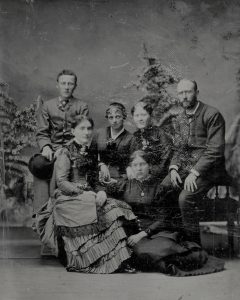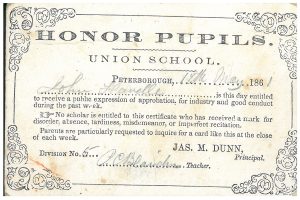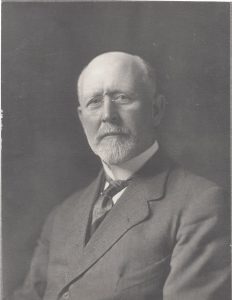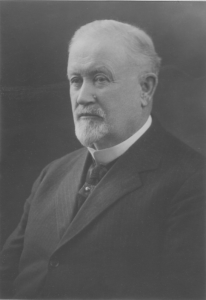Hardship and Lessons in Peterborough

An early family photograph of the Flavelles while in Peterborough. From left to right: William Flavelle, Dorothea Flavelle, Eliza Flavelle Forde, unknown, and John Flavelle.
J. D. and William Flavelle were born into precarious circumstances. Their parents, John and Dorothea Flavelle (1823-1882; 1823-1908) had emigrated from Ireland in 1847 to escape the ongoing famine. John and Dorothea settled in Peterborough County and had J. D. and William in the early 1850s. Their aforementioned elder sons, and their younger brother Joseph (1858-1939), would go on to find unexpected financial success, but were born into hardship. John and Dorothea also had two daughters Mary (1849-1898) and Margaret (1955-1891).
John Flavelle, J. D. and William Flavelle’s father, was an alcoholic. He escaped famine in Ireland and purchased a farm in northern Peterborough — which was unsuccessful at operating. Though described as warm-hearted and well intentioned, he was prone to weekly binges and drunken rages. John was unable to bring in a reliable income, aside from a short period in the employ of Glen’s Grocery Store as a bookkeeper after moving to Peterborough’s centre in 1852. His wife (and, eventually, his sons) had to find ways to support their family.
Dorothea opened a private school in her home in the early 1850’s, aided by her mother Katherine Brunker and sister Lydia Brunker, to help make ends meet. Children of prominent businessmen from the Lakefield and Peterborough area, like Mossum Boyd, were taught with strictness and proficiency. Students were taught the core subjects of orthography, reading, writing, arithmetic, history, grammar, geography, natural philosophy and botany, and electives such as music, chalk drawing, and French. Local residents believed the Union School to be inefficient and less desirable for their children’s educational requirements. Dorothea’s school was well-regarded by the community. Katherine retired at the start of the 1854 school year due to declining health. The two sisters continued to operate the school until Dorothea took a job with the Union School in 1862.
This precarious lifestyle and instability that the young William and J. D. grew up in would continue to affect their outlook on life. The very rooms where William and J. D. enjoyed their mother’s comfort and security were used to educate other children.
The Flavelles moved at least three times, from the Rubridge Street house to Water Street and then to Burnham’s Block on George Street above Glover & Robinson’s store by May 1862. The Flavelle brothers attended their mother’s private school before moving to Peterborough’s Union School by 1860. Following their mother’s example, both William and J. D. excelled in grammar school.
Seeing the example set by their mother, both William and John excelled in grammar school. Taking a series of small jobs to develop skills at selling goods for local merchants, the brothers would put these skills to use at age 14 by pursuing formal business employment, instead of moving forward to high school. They helped their mother and younger siblings by contributing to the family’s finances in this way. Dorothea was able to secure J. D. a clerkship with her brother, J. R. Dundas, at Lindsay in 1864 and William an apprenticeship with a grocer in Peterborough three years later.
The brothers would later carry their mother’s strength and determination in their businesses and community involvement.




